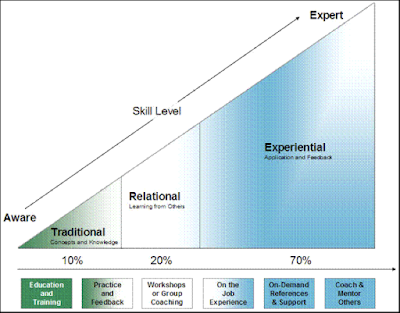
Coaching is a skill
An ability to help others improve a skill through a combination of- Observing behavior related to a particular skill
- Asking questions and listening to understand strengths and opportunities for improvement
- Providing support and feedback via a mix of
- asking and telling
- observing and showing
- getting involved and leaving room for independent learning
It is about facilitating learning
Mutual respect and purpose enable success anything else courts failure.

Learners move through stages of competence

Coaches ask a lot of questions to engage
Coaches give good feedback, a model

- Have a conversation.
- Avoid making judgments or expressing personal feelings about what you have seen.
- Remember, it’s not what you say; it’s how you say it.
- Be supportive and respectful when giving feedback.
- Maintain and enhance self-esteem when giving feedback.
Coaches balance purposeful interactions
Approach coaching sessions on a case-by-case basis…
Seek to make themselves obsolete for this skill for this coachee
Deal effectively with the emotions that come up so that the coachee values the experience (even when it is not fun)…
Avoid the “expert’s mistake” An expert often shares so much information that the learner gets lost.
An expert may:
- Operate from ego (look at how much I know); or
- May feel like they need to share everything they know so the coachee won’t make a bad decision, or simply
- Forget that a learner can only absorb a certain amount of information at a time
Create a Culture of Learning, Apply Adult Learning Theory
Malcolm Knowles introduced Adult Learning Theory in 1968. The fundamental pillars are that
- Adults want to participate in both the planning and evaluation attached to their instruction.
- Experiences, both good and bad, serve as the backdrop for all learning activities.
- Adults first gravitate towards learning things that are directly relevant to their job or personal life.
- Adult learning centers on problems, not subjects.
Adults generally learn
- 10% through Traditional methods (reading and lectures to learn concepts and facts)
- 20% through Relational methods - learning from others
- 70% through Experiential methods - learning on the job
Coaching is exercised in Relational and Experiential methods.
Tips:
- Quiz students before each traditional learning session so they may ask themselves:
- What do I already know? (before)
- What am I to learn in this session? (when I’m done)
- Quiz students after each traditional learning session to support retention.
- Use “spaced repetition” for facts and concepts that must be retained for long periods of time
- Spaced repetition is an evidence-based learning technique that is usually performed with flashcards.
- Newly introduced and more difficult flashcards are shown more frequently, while older and less difficult flashcards are shown less frequently in order to exploit the psychological spacing effect. The use of spaced repetition has been proven to increase the rate and retention period of learning
The Adult Learning Model
Applying the Adult Learning Model
The flow below illustrates a SME, subject matter expert, conducting a set of “brown bag” learning sessions over a number of weeks. This approach has delivered significant and sustainable benefits and builds a culture of learning when it takes root.

Here is a more sophisticated illustration based on a coach joining a team to teach a complex skill requiring 3-6 months of daily engagement.




No comments:
Post a Comment
Please no spam, advertisements, or unrelated personal discussions.